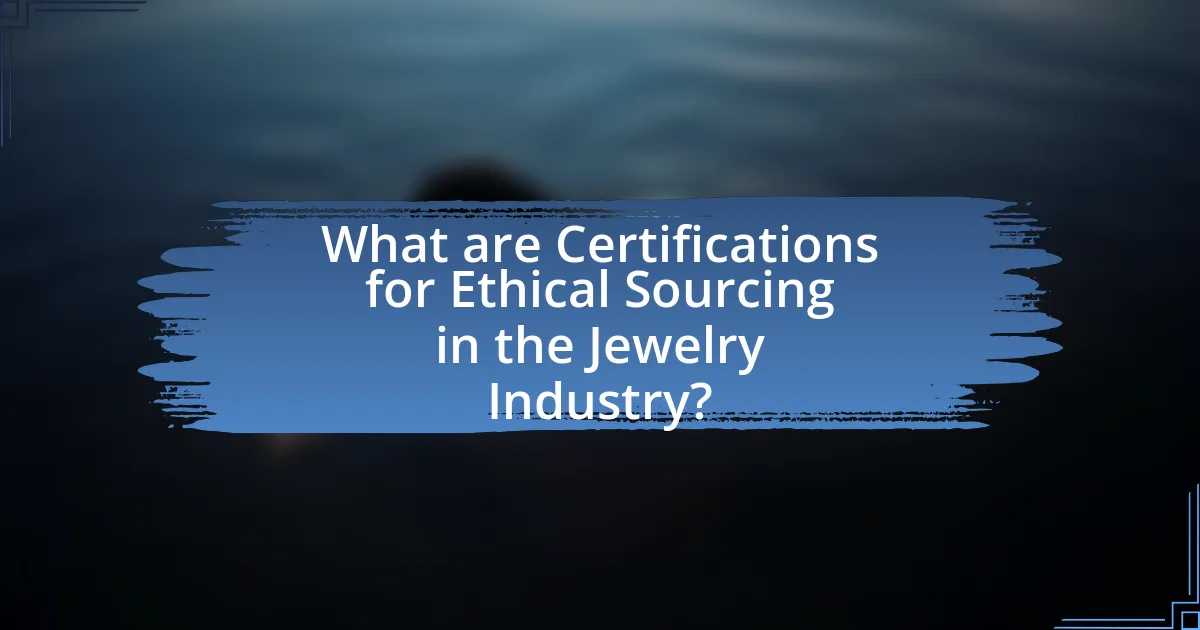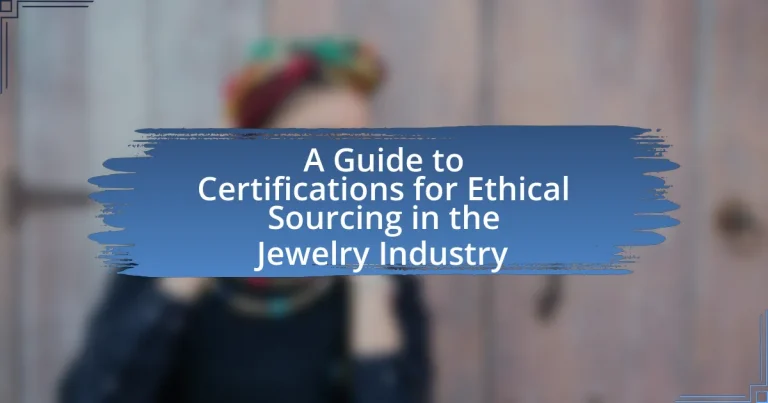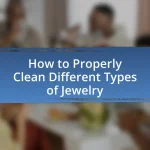The article provides a comprehensive guide to certifications for ethical sourcing in the jewelry industry, focusing on key certifications such as the Responsible Jewelry Council (RJC), Fair Trade Gold, and the Kimberley Process Certification Scheme (KPCS). It outlines the importance of these certifications in promoting accountability, transparency, and consumer trust, while also detailing the certification process, challenges businesses face, and the benefits of obtaining such certifications. Additionally, the article discusses emerging trends, best practices for compliance, and how certifications influence consumer choices, emphasizing the growing demand for ethically sourced jewelry.

What are Certifications for Ethical Sourcing in the Jewelry Industry?
Certifications for ethical sourcing in the jewelry industry include the Responsible Jewelry Council (RJC) certification, Fair Trade Gold certification, and the Kimberley Process Certification Scheme (KPCS). The Responsible Jewelry Council certification ensures that companies adhere to ethical, social, and environmental standards throughout their supply chain. Fair Trade Gold certification guarantees that gold is sourced from responsible mines that pay fair wages and adhere to environmental practices. The Kimberley Process Certification Scheme aims to prevent the trade of conflict diamonds by ensuring that diamonds are sourced from conflict-free zones. These certifications provide a framework for accountability and transparency in sourcing practices within the jewelry industry.
Why are Certifications Important for Ethical Sourcing?
Certifications are important for ethical sourcing because they provide a verified framework that ensures compliance with social, environmental, and economic standards. These certifications, such as Fair Trade or Responsible Jewelry Council, help consumers identify products that are sourced responsibly, thereby promoting transparency in the supply chain. According to a 2021 survey by Nielsen, 66% of global consumers are willing to pay more for sustainable brands, highlighting the demand for certified ethical products. This demonstrates that certifications not only protect workers and the environment but also align with consumer values, driving market demand for ethically sourced jewelry.
What role do certifications play in consumer trust?
Certifications significantly enhance consumer trust by providing verified assurance of ethical practices and quality standards. When consumers see certifications, such as those from recognized organizations, they perceive a commitment to transparency and accountability from brands. For instance, a study by the Nielsen Global Corporate Sustainability Report found that 66% of consumers are willing to pay more for sustainable brands, indicating that certifications can influence purchasing decisions by reinforcing trust in a brand’s ethical sourcing claims.
How do certifications impact supply chain transparency?
Certifications enhance supply chain transparency by establishing standardized criteria that suppliers must meet, thereby ensuring accountability and traceability. For instance, certifications like Fair Trade and Responsible Jewelry Council require companies to disclose sourcing practices and labor conditions, which allows consumers to verify the ethical claims made by brands. Research indicates that 66% of consumers are willing to pay more for products from brands committed to transparency, highlighting the market demand for certified ethical sourcing. This demand drives companies to adopt certifications, ultimately leading to improved transparency in the supply chain.
What Types of Certifications Exist in the Jewelry Industry?
In the jewelry industry, several types of certifications exist to ensure ethical sourcing and quality standards. These certifications include the Responsible Jewelry Council (RJC) certification, which verifies adherence to ethical, human rights, and environmental standards; the Fair Trade certification, which guarantees fair wages and working conditions for artisans; and the Kimberley Process certification, which aims to prevent the trade of conflict diamonds. Each certification serves to promote transparency and accountability within the industry, ensuring that consumers can trust the ethical claims made by jewelry brands.
What are the most recognized certifications for ethical sourcing?
The most recognized certifications for ethical sourcing include Fair Trade, Responsible Jewelry Council (RJC) Certification, and the Kimberley Process Certification Scheme (KPCS). Fair Trade certification ensures that producers receive fair wages and work under safe conditions, promoting sustainable practices. The Responsible Jewelry Council certification focuses on ethical, social, and environmental practices in the jewelry supply chain, ensuring compliance with responsible sourcing standards. The Kimberley Process Certification Scheme aims to prevent the trade of conflict diamonds, ensuring that diamonds are sourced from conflict-free zones. These certifications are widely acknowledged in the jewelry industry for promoting ethical sourcing practices.
How do different certifications vary in their criteria?
Different certifications vary in their criteria based on specific standards, requirements, and focus areas relevant to ethical sourcing in the jewelry industry. For instance, the Responsible Jewelry Council (RJC) certification emphasizes responsible business practices and supply chain transparency, requiring members to adhere to a comprehensive Code of Practices. In contrast, the Fair Trade certification focuses on fair labor practices and equitable trade, necessitating compliance with social, economic, and environmental standards. Additionally, the Kimberley Process Certification Scheme specifically targets the prevention of conflict diamonds, mandating that diamonds are sourced from conflict-free zones. These variations reflect the distinct priorities and frameworks established by each certification body, ensuring that they address different aspects of ethical sourcing.
How Can Businesses Obtain Certifications for Ethical Sourcing?
Businesses can obtain certifications for ethical sourcing by following established standards set by recognized certification bodies. These organizations, such as Fair Trade, Responsible Jewelry Council, and the Ethical Trading Initiative, provide specific guidelines that businesses must adhere to in order to achieve certification.
To begin the certification process, businesses typically need to conduct a self-assessment against the criteria outlined by the certification body, which may include supply chain transparency, labor practices, and environmental impact. Following this, an external audit is often required to verify compliance with these standards.
For example, the Responsible Jewelry Council requires members to undergo a third-party audit to ensure adherence to their Code of Practices, which emphasizes ethical sourcing and sustainability. This structured approach not only helps businesses gain certification but also enhances their credibility in the market, as consumers increasingly prioritize ethical sourcing in their purchasing decisions.
What steps are involved in the certification process?
The certification process for ethical sourcing in the jewelry industry typically involves five key steps: application, documentation review, on-site audit, corrective action, and certification issuance.
Initially, an organization submits an application to the certifying body, detailing its sourcing practices and compliance with ethical standards. Following this, the certifying body conducts a thorough review of the submitted documentation to ensure all necessary information is provided. Next, an on-site audit is performed, where auditors assess the organization’s practices against the established criteria. If any non-compliance issues are identified during the audit, the organization must implement corrective actions to address these issues. Finally, upon successful completion of all previous steps, the certifying body issues the certification, confirming that the organization meets the ethical sourcing standards.
What challenges do businesses face when seeking certification?
Businesses face several challenges when seeking certification, including high costs, complex compliance requirements, and lengthy application processes. The financial burden of certification can deter smaller companies, as fees for audits and documentation can accumulate significantly. Additionally, the intricate standards set by certifying bodies often require extensive documentation and proof of ethical sourcing practices, which can be difficult to compile. Furthermore, the time-consuming nature of the certification process can lead to delays in market entry, impacting a business’s competitive edge. These challenges are particularly pronounced in the jewelry industry, where ethical sourcing is scrutinized, and adherence to standards is critical for consumer trust.
What are the Key Benefits of Ethical Sourcing Certifications?
Ethical sourcing certifications provide several key benefits, including enhanced brand reputation, increased consumer trust, and improved supply chain transparency. These certifications signal to consumers that a brand adheres to ethical practices, which can lead to higher customer loyalty and sales. For instance, a study by Nielsen found that 66% of global consumers are willing to pay more for sustainable brands, highlighting the financial incentive for companies to pursue ethical sourcing certifications. Additionally, these certifications often require rigorous audits and compliance checks, which can lead to better supply chain management and reduced risks of unethical practices, such as labor exploitation or environmental harm.
How do certifications enhance brand reputation?
Certifications enhance brand reputation by providing verified proof of quality and ethical standards. When a brand obtains certifications, it signals to consumers that it adheres to specific industry standards, which can increase trust and credibility. For instance, certifications like Fair Trade or Responsible Jewelry Council demonstrate a commitment to ethical sourcing and sustainability, appealing to socially conscious consumers. Research indicates that 70% of consumers are willing to pay more for products from brands that are committed to sustainability, highlighting the positive impact certifications can have on brand perception and loyalty.
What financial advantages can come from being certified?
Being certified in ethical sourcing within the jewelry industry can lead to significant financial advantages, including increased marketability and access to premium pricing. Certification enhances brand reputation, attracting consumers who prioritize ethical practices, which can result in higher sales volumes. For instance, a study by the Ethical Trading Initiative found that companies with recognized certifications often experience a 20% increase in customer loyalty and repeat purchases. Additionally, certified businesses may qualify for exclusive contracts with retailers who demand ethical sourcing, further boosting revenue potential.
How Do Certifications Influence Consumer Choices?
Certifications significantly influence consumer choices by providing assurance of ethical practices and quality standards. Consumers often rely on certifications to validate claims regarding sustainability, fair labor practices, and product authenticity, particularly in the jewelry industry. For instance, a study by the Ethical Consumer Research Association found that 66% of consumers are willing to pay more for products that are certified as ethically sourced. This demonstrates that certifications not only enhance consumer trust but also drive purchasing decisions, as they serve as a tangible indicator of a brand’s commitment to ethical sourcing and responsible production.
What factors do consumers consider when choosing ethically sourced jewelry?
Consumers consider several key factors when choosing ethically sourced jewelry, including the origin of materials, labor practices, environmental impact, and certifications. The origin of materials is crucial, as consumers prefer gemstones and metals that are mined or produced without exploitation or harm to communities. Labor practices are also significant; consumers seek assurance that workers are treated fairly and paid a living wage. Environmental impact is another consideration, with many consumers favoring jewelry that minimizes ecological damage through sustainable practices. Certifications, such as Fair Trade or Responsible Jewelry Council standards, provide verifiable proof of ethical sourcing, enhancing consumer trust in the product’s integrity.
How can certifications help consumers make informed decisions?
Certifications help consumers make informed decisions by providing verified information about the ethical sourcing and quality of products. For instance, certifications like Fair Trade or Responsible Jewelry Council ensure that the materials used in jewelry are sourced sustainably and ethically, which can influence consumer choices. Research indicates that 66% of consumers are willing to pay more for sustainable brands, highlighting the importance of certifications in guiding purchasing behavior. By relying on these certifications, consumers can trust that their purchases align with their values regarding environmental and social responsibility.
What Trends are Emerging in Ethical Sourcing Certifications?
Emerging trends in ethical sourcing certifications include increased consumer demand for transparency, the integration of technology for traceability, and a focus on social equity alongside environmental sustainability. Consumers are increasingly prioritizing brands that provide clear information about their sourcing practices, leading to a rise in certifications that emphasize transparency. Additionally, technologies such as blockchain are being adopted to enhance traceability in supply chains, ensuring that materials are sourced responsibly. Furthermore, there is a growing emphasis on social equity, with certifications now addressing labor rights and fair wages, reflecting a holistic approach to ethical sourcing in the jewelry industry.
How is technology shaping the future of certifications?
Technology is shaping the future of certifications by enhancing transparency, accessibility, and efficiency in the verification process. Digital platforms and blockchain technology enable real-time tracking of materials and ethical sourcing practices, ensuring that certifications are not only accurate but also easily verifiable by consumers and stakeholders. For instance, the use of blockchain allows for immutable records of a product’s journey from mine to market, which significantly reduces the risk of fraud and misrepresentation. Additionally, online learning and assessment tools facilitate the certification process for individuals and organizations, making it more accessible to a broader audience. This shift towards technology-driven solutions is evidenced by the increasing adoption of digital certifications and the integration of advanced data analytics in monitoring compliance with ethical standards in the jewelry industry.
What new standards are being developed in the industry?
New standards being developed in the jewelry industry focus on ethical sourcing and sustainability. Organizations such as the Responsible Jewelry Council (RJC) are enhancing their certification frameworks to include stricter guidelines on environmental impact, labor rights, and traceability of materials. For instance, the RJC’s updated Code of Practices emphasizes responsible sourcing of precious metals and gemstones, ensuring that they are conflict-free and sourced from environmentally sustainable operations. These developments reflect a growing commitment within the industry to align with global sustainability goals and consumer demand for ethically produced products.
What Best Practices Should Businesses Follow for Ethical Sourcing Certifications?
Businesses should prioritize transparency, traceability, and stakeholder engagement when pursuing ethical sourcing certifications. Transparency involves openly sharing sourcing practices and supply chain information, which builds trust with consumers and stakeholders. Traceability ensures that materials can be tracked back to their origin, confirming compliance with ethical standards. Engaging stakeholders, including suppliers, communities, and customers, fosters collaboration and accountability, enhancing the overall integrity of the sourcing process. According to the Ethical Trading Initiative, companies that implement these best practices are more likely to achieve successful certification outcomes and maintain consumer confidence.
How can businesses effectively communicate their certification status to consumers?
Businesses can effectively communicate their certification status to consumers by prominently displaying certification logos on product packaging and marketing materials. This visual representation helps consumers quickly identify certified products, enhancing trust and transparency. Additionally, businesses should provide detailed information about the certification process on their websites, including the standards met and the certifying body involved. Research indicates that 73% of consumers are willing to pay more for products from certified brands, highlighting the importance of clear communication regarding certification status.
What ongoing practices ensure compliance with certification standards?
Ongoing practices that ensure compliance with certification standards include regular audits, employee training, and supply chain transparency. Regular audits assess adherence to standards, identifying areas for improvement and ensuring accountability. Employee training programs educate staff on compliance requirements, fostering a culture of ethical sourcing. Supply chain transparency involves documenting and sharing sourcing practices, which helps verify that materials meet certification criteria. These practices collectively reinforce compliance by establishing a systematic approach to maintaining standards in the jewelry industry.


